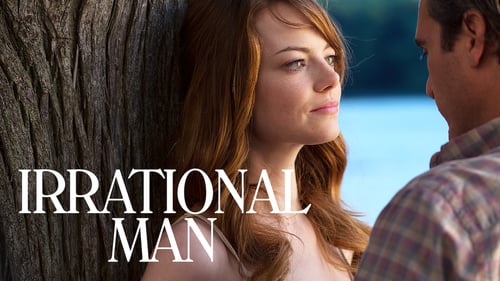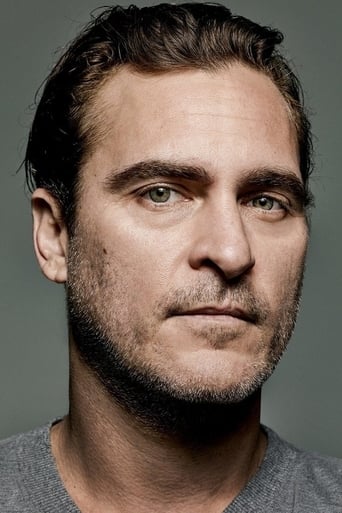Antonia Tejeda Barros
Abe (Joaquin Phoenix): "Anxiety is the dizziness of freedom".Irrational Man. Wow. Such a movie. A delight for anyone who loves philosophy, especially existentialist philosophy, my favorite!The beginning of the movie is amazing. You can only hear a car and, right after the opening credits, Ramsey Lewis' amazing funky jazz. The first word, pronounced by Joaquin Phoenix, is "Kant". Woody Allen seems to have made Irrational Man for philosophy lovers: Kierkegaard, Heidegger, Sartre, Dostoevsky, and Hannah Arendt's thesis dance in this film. Anxiety, despair, the meaning of our existence, choice, morality, suicide, and murder are the film's main themes.Joaquin Phoenix's performance is stunning. Really brilliant. Phoenix gained 33 pounds for the role of Abe, a controversial philosophy professor, anguished, depressed and a nihilist who talks to his students about how cruel and frustrating human existence is. Phoenix appears like a man made of blood and flesh, vulnerable and tormented, who prefers to live philosophy than to talk about.I must admit that I am not a big fan of Emma Stone. I find all her performances basically the same. Nevertheless, her performance in Irrational Man is convincing thanks to Woody's amazing writing. Still, she could have bothered herself and take some piano lessons if she was going to play the role of a piano student. Oh, well, those young divas...The other woman is Rita, performed by Parker Posey, an awesome actress. Her performance is fresh, elegant and very real.Ethan Phillips (who played the nasty IRS agent Gorsky in the 90's comedy Green Card) has a small role in the movie and plays Jill's father. I read some negative reviews about Jamie Blackey's performance, who plays Jill's boyfriend, Roy, but truthfully I think that he plays his role to perfection (a simple guy in love, plain and zero exciting).Irrational Man has a bit of Match Point and a lot of Cassandra's Dream, being at the same time original, genuine, and surprising. The end is unpredictable and has a taste of Hitchcock. Woody had already used Crime and Punishment in Crimes and Misdemeanors, Match Point and Cassandra's Dream. Ramsey Lewis (who, I must admit, I didn't know -I have already bought several CDs of his) accompanies us with his amazing funky jazz during all the film. Woody's taste in music is definitely the best.The Adair University (fictitious), where Abe taught before, is the same University that honours Harry Block in Deconstructing Harry and where Sondra Pransky studied journalism in Scoop (how funny).Irrational Man is the last movie produced by Jack Rollins (Woody's producer for over 45 years). Rollins died in 2015, age 100.Abe brings to the extreme the first principle of existentialism: human beings are what we make of ourselves ("l'homme n'est rien d'autre que ce qu'il se fait", argues Sartre in L'existentialisme est un humanisme). Man is what he decides to be, in complete freedom. Sartre argues that we don't have freedom, but that we are freedom. Our freedom can never be renounced. Even if we decide not to be free, we are deciding in complete freedom not to be free. That's what reflects Sartre's explosive sentence "l'homme est condamné à être libre"(1). We are free and we are completely responsible of what and who we are. There is no God. We are alone in the Universe. We are the solely owners of our own existence and the only responsible ones for our own choices.Sartrean existentialism is a philosophy of freedom and action. To think about doing something, to hope, to wish, does not count at all for Sartre. Only to act has real value, and Abe knows it. If we wish for somebody to be dead, the only coherent action is murder. But what about morality? Well, are all men worth living? Really cruel people are parasites, are they not? Wouldn't the world be a better place with less parasites?When Abe decides to kill the corrupted judge, his life makes sense again. He starts enjoying life: he has big breakfasts (not only back coffee), is able to make love again, writes poetry again, and feels strong and alive. Suicide is not an option for Abe any more. His life has meaning. His murder plans are what give meaning to his existence.Man is a being in search for meaning. That was brilliantly said by Viktor Frankl in 1946 in his heartbreaking book Man's Search for Meaning (originally written in German and untitled ...trotzdem Ja zum Leben sagen. Ein Psychologe erlebt das Konzentrationslager). Frankl's thesis is a yes to life with capital letters. His message: an unconditional faith in the meaning of existence: "meaning is available under any conditions, even the worst conceivable ones"(2). Life has always meaning, until the end ("life has a meaning to the last breath"(3) and it's our duty to look for this meaning. Our main task is to have to give a meaning to our own existence.Frankl argues that a person who has found the meaning of his life is able to give his life for that meaning, and a person who has not found the meaning of his life can easily commit suicide. At the beginning of the film, Abe suffers from existential vacuum and does not mind at all to die when he demonstrates to his students how to play the Russian roulette. But when he starts planning the murder and finds a meaning for his existence, he rejects suicide and embraces life.Frankl argues that life has always meaning. Sartre, on the contrary, argues that nothing has real meaning: everything is absurd (like Camus). We are alone, without God and without excuses, and we have to carry courageously the emptiness of our human existence.Frankl defines man as freedom, responsibility and meaning. Sartre defines man as freedom, responsibility and anguish. In the first half of Irrational Man, Abe follows Sartre, and, afterwards, follows Frankl. Frankl's thesis is less dark than Sartre's. Nevertheless, I have always found an answer (even if a hard and depressing one) in Sartre's philosophy, and, for what I've read, I think that Woody too.In an interview from 2010, Woody was asked about his vision on life, and said: "I have a very grim pessimistic view of it. I always had. Since I was a little boy. It hasn't gotten worse with age or anything. I do feel that it's a grim, painful, nightmarish, meaningless experience and that the only way you can be happy is if you tell yourself some lies and deceive yourself (...) One must have one's illusions to live. If you look at life too honestly life does become unbearable because it is a pretty grim enterprise"(4). I agree completely. I think that neither life nor death have real meaning, so we have to create, love and grow as much as we can in order to not to succumb to despair.Irrational Man is an absolutely brilliant film. A delightful masterpiece. 10 / 10The best: the huge dosis of existential philosophy, Joaquin Phoenix's stunning performance, Parker Posey, and Ramsey Lewis' funky jazz.The worst: Emma Stone's perfectly combed hair.Antonia Tejeda Barros, Madrid, August 16, 2018NOTES1. Sartre, Jean-Paul. L'existentialisme est un humanisme, p. 392. Frankl, Viktor E. The Unheard Cry for Meaning, p. 413. Frankl, Viktor E. "Introduction", The Doctor and the Soul, p. xix4. Allen, Woody. Press conference You Will Meet A Tall Dark Stranger, Cannes, May 2010BIBLIOGRAPHYFrankl, Viktor E. ... trotzdem Ja zum Leben sagen. Ein Psychologe erlebt das Konzentrationslager. München: Kösel, 2014 (2009), pp. 7-191Frankl, Viktor E. Man's Search for Meaning (trad. Ilse Lasch). Boston: Beacon, 2006, pp. ix-165Frankl, Viktor E. The Doctor and the Soul. From Psychotherapy to Logotherapy (trad. Richard y Clara Winston). New York: Vintage Books, 1986, pp. ix-318Frankl, Viktor E. The Unheard Cry for Meaning. New York: Touchstone, 1978, pp. 13-191Frankl, Viktor E. TV interview, Toronto, 1972. THE WILL TO MEANING.Sartre, Jean-Paul. L'être et le néant. Essai d'ontologie phénoménologique. France: Gallimard, 2010 (1943), pp. 11-676Sartre, Jean-Paul. L'existentialisme est un humanisme. France: Gallimard, 2003 (1945), pp. 9- 109
sbsieber
I have always enjoyed the classic (and dare I say "original") Woody Allen movies that he produced in his early career. Over the years, they have become a series of hit-and-miss films whose only claim to fame is its director and the all-star cast he still manages to attract. I haven't heard of most of them, but when I stumble across one on Netflix, I know it's an Allen movie the moment one of the characters begins to speak.I don't understand how Allen manages to take a very disparate group of actors with different styles and techniques and somehow make them all sound the same. I call it the "Wooden Allen Method" (or "Syndrome", in the cases of the actors who appear in more than one of his films.) All of his actors become infected with an inauthentic, earnest intellectualism and speak their lines with the same stuttering, sighing angst. There have been exceptions, of course, as in the case of Cate Blanchett in Blue Jasmine, but in general every Allen ingenue sounds like every other ingenue, and every world-weary professor/huckster sounds the same, and the ingenues and professors always seem to end up "falling in love" and into bed together. Spare me. It is such a transparent conceit of a man past his prime to think that every gifted, beautiful young woman is frothing at the bit to bed his pot-bellied, greasy-haired self. The love stories in Allen films are rarely convincing, and weaken the overall trajectory of the movie. Let's all pause for a few moments and watch while a Beautiful Young Thing rolls around in ecstasy with a Withered Old Thing.The one sparkling exception however, was Parker Posey whose natural energy, and ebullience informed her small role with realism and humanity. I would love to see more of her in films that showcase her intelligence, wit and vivacity. She is maturing into a very fine actress.Overall, it's an alright movie; a passing indulgence of a long winter's eve. The location is beautiful, the story is interesting, and production value is sound.








